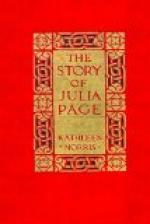Miss Pierce, a delicate, refined, unmarried woman, was a daily teacher in the kindergarten, and grew very fond of the grave, demure, silent Miss Page. Julia felt enormously flattered when Miss Pierce suggested that she come home with her during one of Miss Toland’s brief absences, and as merry, impulsive, affectionate little Miss Scott followed suit, she usually had the choice of two pleasant places in which to spend her holidays.
Miss Pierce lived with her old mother in a handsome upper flat on Broadway. Julia liked the quiet, dignified neighbourhood, and thought Mrs. Pierce a lovely old lady. She chattered with Adachi, the Japanese boy, tried the piano, whistled at the canary, and sat watching Mrs. Pierce’s game of patience with the absorption of a rosy-cheeked, wide-eyed child. Miss Pierce, glancing up now and then from her needlework, thought it very nice to see pretty Miss Page there and Mamma so well amused, and wished that she had more inducements to offer her young guest. But Julia found the atmosphere, the quiet voices and quiet laughter, inducement enough, and quite touched Mrs. Pierce with her gratitude.
The first visit to Miss Scott’s house, however, was a revelation, and the memory of it stood out in such bold colours as made the decorous pleasures of the visit to Miss Pierce turn pale. Julia was rushed into the centre of a group of eager, noisy, clever young people, six brothers and sisters who had been motherless from babyhood, and were in mourning now for their father. The Scotts were bold and outspoken in their grief as in everything else; they showed Julia their father’s picture before she had been ten minutes in the house, and Kennedy—Julia’s “Miss Scott” of The Alexander—flung open the big desk so violently as to bring two vases and a calendar to the floor, and read Julia various notes and letters that had been sent them at the time of their father’s death, until tears stood in more than one pair of lovely black eyes. Dinner was somehow cooked in a Babel of voices, served in a rush, and afterward their chatter rose above the hissing of dishwater and the clash of hot plates. Julia laughed herself tired at the nonsense, the mad plans, and untrammelled dreams. Kennedy was to be a writer, ‘Lizabeth the president of a girls’ college, little Mary wanted to live in “Venith.” The boys were all to be rich; Peter, the oldest, drew his brothers into a long, serious discussion as to the exact proportions of the ideal private car.




